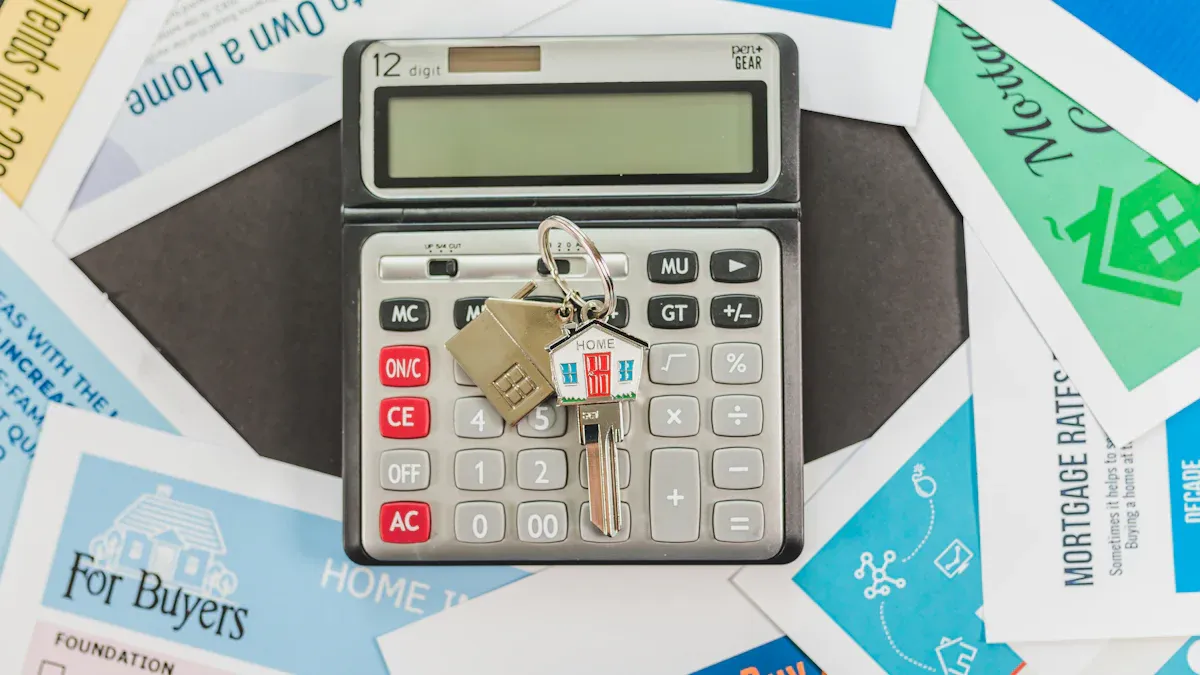- EasyCard
- Trade
- Help
- Announcement
- Academy
- SWIFT Code
- Iban Number
- Referral
- Customer Service
- Blog
- Creator
Unveiling Hong Kong HIBOR Rates: Save Money on Your Mortgage

Image Source: unsplash
If you want to save every penny on your mortgage, you must closely follow the trends in Hong Kong HIBOR rates. The latest data for May 2025 shows that the one-month HIBOR has dropped to 0.96%, with the actual HIBOR-based mortgage (H-plan) interest rate at just 2.26%, far below the capped rate of 3.5%. Most Hong Kong banks currently offer H-plans that are more cost-effective than Prime-based mortgages (P-plans), and choosing an H-plan can directly reduce your interest burden. By comparing different banks’ H-plan offers and making good use of cash rebate incentives, you can further lower your mortgage costs.
Key Points
- HIBOR mortgage rates fluctuate with the market; when rates fall, your mortgage interest decreases, helping you save on repayment pressure.
- Different banks’ HIBOR mortgage plans vary in interest rates and cash rebates; you should compare rates, capped rates, and rebates to find the most suitable plan.
- Regularly monitor Hong Kong HIBOR rate trends and consider refinancing when rates drop to further reduce mortgage costs.
- Make good use of cash rebates offered by banks and plan their usage wisely to alleviate initial mortgage pressure and increase financial flexibility.
- Choosing between an HIBOR mortgage or a P-plan should be based on your personal risk tolerance and repayment needs, flexibly adjusting your mortgage strategy for the best cost-saving outcome.
What is a HIBOR Mortgage?
How It Works
If you want to understand what a HIBOR mortgage (H-plan) is, it’s quite simple. An H-plan is based on the Hong Kong Interbank Offered Rate (HIBOR), with the bank adding a fixed percentage on top, typically using the one-month HIBOR. This rate fluctuates with the market, and each time your mortgage is renewed, the bank recalculates your mortgage interest based on the latest Hong Kong HIBOR rate. An H-plan is a floating-rate mortgage, so when market rates fall, your mortgage interest also decreases.
Tip: H-plans come with an annual interest rate cap (capped rate), so even if market rates surge, you won’t pay above this cap.
Interest Rate Calculation
When you apply for an H-plan, the bank calculates the actual interest rate using “HIBOR + fixed spread.” For example, in 2023, the one-month HIBOR was around 0.44%, and banks typically add 1.5%, resulting in an actual rate of about 1.94%. In 2025, the capped rate for H-plans is approximately 3.5%. If Hong Kong HIBOR rates continue to fall, the interest you actually pay will be below the capped rate. Banks adjust your mortgage rate monthly or quarterly based on the latest HIBOR, allowing you to benefit from market rate reductions.
H-Plan vs. P-Plan
You might wonder, what’s the difference between an H-plan and a P-plan? A P-plan (Prime-based mortgage) is based on the bank’s prime rate, which is usually more stable but has a higher baseline, typically 2.5% or more. An H-plan, on the other hand, fluctuates with Hong Kong HIBOR rates, and when market rates fall, H-plans are generally more cost-effective than P-plans.
- H-plan: Floating rate, heavily influenced by market conditions, with a capped rate for protection.
- P-plan: More stable rate, but higher baseline, less responsive to market changes.
Whether you choose an H-plan or a P-plan should depend on your risk tolerance and judgment of market trends.
Hong Kong HIBOR Rate Trends

Image Source: pexels
Recent Changes
If you’ve been following Hong Kong HIBOR rates, you’ll notice significant fluctuations in recent years. In 2023, the one-month HIBOR once rose to 4.5%, significantly increasing mortgage interest costs. However, starting in the second half of 2024, Hong Kong HIBOR rates noticeably declined. By May 2025, the one-month HIBOR has fallen to between 0.58% and 0.62%. This change has reduced the actual H-plan interest rate to below 2.87%. When you make mortgage payments, your monthly interest expenses are significantly lower, greatly reducing repayment pressure.
2025 Forecast
According to Morgan Stanley’s latest report, experts predict that Hong Kong HIBOR rates will continue to decline in 2025. The report indicates that the one-month HIBOR will drop from 4.5% in the first half of 2024 to 2.75%. This forecast reflects the possibility of the U.S. Federal Reserve cutting rates, driving Hong Kong HIBOR rates downward. If you choose an H-plan, your actual mortgage rate could fall to 3.25%. This trend helps you reduce your mortgage burden, especially for those applying for new mortgages or considering refinancing.
Impact on Mortgages
When Hong Kong HIBOR rates fall below 1%, the interest portion of your monthly mortgage payments decreases significantly. You can pay off the principal faster, and overall interest expenses are reduced. If you choose an H-plan, the current rate is well below the capped rate, making mortgage costs significantly lower. However, if Hong Kong HIBOR rates remain high for an extended period in the future, a P-plan (Prime-based mortgage) may be more stable and suitable for those seeking consistent repayments. You should flexibly choose the most suitable mortgage plan based on your financial situation and market trends.
Tip: You can regularly monitor Hong Kong HIBOR rate trends and consider refinancing when rates drop to save even more money.
Bank HIBOR Mortgage Comparison

Image Source: unsplash
If you want to choose the most cost-effective HIBOR mortgage plan, you must first understand the latest offerings from major banks. In 2025, Hong Kong banks have adjusted their HIBOR mortgage products due to declining funding costs, with some even lowering capped rates to attract refinancing. You can choose the most suitable bank based on factors like interest rates, cash rebates, and lock-in periods.
HSBC
As a market leader, HSBC’s HIBOR mortgage plan has always caught your attention. In 2025, HSBC offers an “H+1.3%” rate structure with a capped rate of 3.5%. When you apply, the bank calculates the actual interest rate based on the HIBOR published by the Hong Kong Association of Banks. HSBC offers a cash rebate of up to 1.2% of the loan amount, with a typical lock-in period of 2 years. HSBC uses its proprietary HIBOR as the calculation basis, closely aligned with market HIBOR trends.
Bank of China (Hong Kong)
Bank of China (Hong Kong)’s HIBOR mortgage plan is also highly competitive. If you choose BOC, you’ll see an “H+1.4%” rate with a capped rate of 3.4%, slightly lower than HSBC. The cash rebate is about 1.1%, with a 2-year lock-in period. BOC uses the Hong Kong Association of Banks’ HIBOR as its benchmark, with transparent rate adjustments, making it easy for you to track mortgage costs.
Standard Chartered
Standard Chartered’s HIBOR mortgage plan emphasizes flexibility. You can enjoy an “H+1.35%” rate with a capped rate of 3.45%. The cash rebate is about 1.15%, with a 2-year lock-in period. Standard Chartered also uses the Hong Kong Association of Banks’ HIBOR as its benchmark and offers online application discounts, making the process more convenient for you.
Bank of East Asia
Bank of East Asia’s HIBOR mortgage plan is suitable for those seeking stability. The rate is “H+1.38%” with a capped rate of 3.48%. The cash rebate is about 1.1%, with a 2-year lock-in period. BEA also references the Hong Kong Association of Banks’ HIBOR and provides dedicated relationship managers to assist with your mortgage application.
Other Banks
You can also consider Industrial and Commercial Bank of China, Citibank (International), Hang Seng Bank, and others. These banks’ HIBOR mortgage products typically offer “H+1.5%” rates with capped rates around 3.5%. Cash rebates generally range from 1% to 1.2%. Some banks, like Hang Seng, use proprietary HIBOR calculations similar to HSBC. The Hong Kong Association of Banks publishes HIBOR daily, referencing quotes from at least 12 banks, ensuring the rates you receive are representative of the market.
Tip: When choosing an HIBOR mortgage, pay attention to whether the bank has recently lowered its capped rate. As funding costs decline, banks adjust their products, potentially allowing you to enjoy lower rates. You should also compare cash rebates and lock-in periods to increase mortgage flexibility.
Plan Comparison Table
You can refer to the table below to quickly compare key points of major banks’ HIBOR mortgage plans for 2025:
| Bank | Rate Structure | Capped Rate | Cash Rebate | Lock-in Period | HIBOR Benchmark |
|---|---|---|---|---|---|
| HSBC | H+1.3% | 3.5% | 1.2% | 2 years | Proprietary HIBOR |
| Bank of China (Hong Kong) | H+1.4% | 3.4% | 1.1% | 2 years | HKAB HIBOR |
| Standard Chartered | H+1.35% | 3.45% | 1.15% | 2 years | HKAB HIBOR |
| Bank of East Asia | H+1.38% | 3.48% | 1.1% | 2 years | HKAB HIBOR |
| Other Major Banks | H+1.5% | 3.5% | 1.0-1.2% | 2 years | HKAB/Proprietary HIBOR |
You can see that different banks’ HIBOR mortgage products, rate structures, and market performance are detailed, supported by systematic market research. The Hong Kong Association of Banks publishes HIBOR daily, ensuring the data you receive is authoritative. When choosing, you should adjust your mortgage strategy based on your mortgage needs, Hong Kong HIBOR rate trends, and bank promotions.
Money-Saving Tips for Mortgages
Selection Tips
If you want to save money on your mortgage, you need to know how to choose the right mortgage plan. You can make your choice based on your financial situation and market trends. If you prioritize low interest rates and are willing to tolerate rate fluctuations, an H-plan (HIBOR mortgage) is more suitable for you. When Hong Kong HIBOR rates fall, your mortgage interest decreases, reducing overall repayment pressure. If you prefer stable payments and want to avoid market fluctuations, a P-plan (Prime-based mortgage) is more suitable. You should first calculate your monthly payments, assess whether you can handle the risk of rising rates, and then make your decision.
Tip: You can use online mortgage calculators to simulate monthly payments under different interest rates, helping you make informed decisions.
Leveraging Cash Rebates
When you apply for a mortgage, banks typically offer cash rebates or other incentives. You can make good use of these rebates to alleviate initial mortgage pressure. For example, some Hong Kong banks offer cash rebates of 1% to 1.2% of the loan amount. You can use this rebate to cover legal fees, renovation costs, or as an emergency reserve. You can also compare the rebate amounts and conditions across banks to choose the most advantageous plan.
- You should note that rebate amounts are tied to the lock-in period. If you repay early or refinance within the lock-in period, the bank may reclaim part of the rebate.
- You can inquire about banks’ latest promotions and choose products with higher rebates to further reduce mortgage costs.
Note: After receiving a cash rebate, plan its usage carefully to avoid overspending.
Refinancing Timing
If you want to save more money, consider refinancing at the right time. When Hong Kong HIBOR rates fall and the market offers lower rates or higher rebates, you can consider refinancing to another bank. When refinancing, you should confirm whether the lock-in period has ended, as you may otherwise need to pay penalties or return part of the rebate. You can compare different banks’ mortgage rates, capped rates, and rebates to choose the most suitable new plan.
- You should regularly monitor market information, especially U.S. Federal Reserve rate cut announcements, as these directly impact Hong Kong HIBOR rates.
- You can consult professional mortgage advisors to understand the refinancing process and key considerations to ensure a smooth transition.
Tip: After refinancing, review your financial situation to ensure the new plan genuinely helps you save money.
If you want to maximize savings on your mortgage in 2025, you can choose an HIBOR mortgage and stay updated on the latest rates and cash rebates from major Hong Kong banks.
- You should choose the most suitable plan based on your financial situation.
- You should regularly monitor market trends and refinance flexibly when rates drop.
Reminder: Mortgage interest is calculated in U.S. dollars (USD), so refer to the exchange rate on the day to ensure the plan meets your needs.
FAQ
What are the risks of a HIBOR mortgage?
When you choose a HIBOR mortgage, the interest rate fluctuates with the market. When HIBOR rises, your monthly payments increase. You need to assess whether you can handle rate fluctuations.
When is the right time to refinance?
You can consider refinancing when market HIBOR rates fall or other Hong Kong banks offer higher cash rebates. Pay attention to lock-in periods and associated fees.
How is HIBOR mortgage interest calculated?
Banks calculate interest using “one-month HIBOR + fixed spread.” For example, if HIBOR is 0.6% and the spread is 1.3%, the actual rate is 1.9%. You need to refer to the exchange rate to convert to U.S. dollars (USD).
What’s the difference between a HIBOR mortgage and a P-plan?
HIBOR mortgage rates are floating, allowing you to save interest when market rates fall. P-plan rates are more stable but typically higher. You should choose based on your needs.
What currency is mortgage interest calculated in?
Your mortgage interest is calculated in U.S. dollars (USD). You need to monitor exchange rate changes to ensure repayment amounts fit your budget. Hong Kong banks convert based on the daily exchange rate.
With Hong Kong’s HIBOR dropping to 0.96% in May 2025, H-plan mortgages offer effective rates as low as 2.26%, reducing borrowing costs—how can you further amplify wealth growth in this low-rate environment? BiyaPay offers an all-in-one financial platform, enabling seamless trading of Hong Kong’s financial and property sectors and US stable assets without offshore accounts, empowering you to capitalize on low-HIBOR investment opportunities with flexible fund allocation.
Supporting USD, HKD, and 30+ fiat and digital currencies, real-time exchange rate tracking ensures cost transparency, while global remittances to 190+ countries feature transfer fees as low as 0.5%, with swift delivery to meet global wealth management needs. A 5.48% annualized yield savings product, with no lock-in period, balances HIBOR volatility with steady returns. Sign up for BiyaPay today to integrate HIBOR mortgage savings with BiyaPay’s worldwide financial solutions, creating an efficient, adaptable wealth management experience!
*This article is provided for general information purposes and does not constitute legal, tax or other professional advice from BiyaPay or its subsidiaries and its affiliates, and it is not intended as a substitute for obtaining advice from a financial advisor or any other professional.
We make no representations, warranties or warranties, express or implied, as to the accuracy, completeness or timeliness of the contents of this publication.




Contact Us
Company and Team
BiyaPay Products
Customer Services
is a broker-dealer registered with the U.S. Securities and Exchange Commission (SEC) (No.: 802-127417), member of the Financial Industry Regulatory Authority (FINRA) (CRD: 325027), member of the Securities Investor Protection Corporation (SIPC), and regulated by FINRA and SEC.
registered with the US Financial Crimes Enforcement Network (FinCEN), as a Money Services Business (MSB), registration number: 31000218637349, and regulated by FinCEN.
registered as Financial Service Provider (FSP number: FSP1007221) in New Zealand, and is a member of the Financial Dispute Resolution Scheme, a New Zealand independent dispute resolution service provider.



















